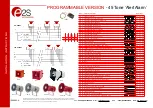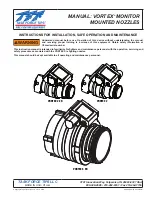Lexicon
300 V 3.0 Owner's Manual
4-12
Rich Plate Basic Sounds Page
This control adjusts the reverberation time of the independent reverberator. The
range of action is limited. Be careful — both long and short reverb times may
sound unnatural. If a much longer or shorter reverb time than the preset provides
is desired, SIZE should be changed first.
SIZE allows you to vary the apparent size of the space over a wide range. SIZE
is the most dramatic control, and must be selected to match the music or program
material. It should be the first control that you adjust to tailor the desired space.
SIZE also affects the reverb time, in a similar way to the standard reverb
programs.
ROLL sets the frequency above which a 6 dB/octave low-pass filter attenuates
the processed signal. It attenuates both pre-echoes and reverberant sound.
High frequencies are often rolled off with this parameter, resulting in more natural
sounding reverberation.
PDLY adds an additional delay to the reflections and to the reverberation. This
control may be useful in a sound reinforcement situation, or for ambience effects.
Both DDLY and PDLY have 4-sample (approximately 0.1msec) resolution.
RLVL sets the amount of reverberation in the processed signal. It is normally
FULL, but may be reduced for effects where the pre-echoes should dominate.
TDCY sets the frequency above which sounds decay at a progressively faster
rate. It filters all the sound except the pre-echoes. When set relatively low, it gives
a darker tone to the reverberation, simulating the effect of air absorption in a real
hall. TDCY also helps keep the ambience generated by the program from
muddying the direct sound.
BASS sets the reverb time for low-frequency signals, as a multiplier of the RTIM
parameter. For example, if BASS is set to 2X, and RTIM is set to two seconds,
the low frequency reverb time will be four seconds. For a natural-sounding hall
ambience, we recommend values of 1.5X or less.
XOVR sets the frequency at which the transition from RTIM to BASS takes place.
XOVR should be set at least two octaves higher than the low frequency you want
to boost. For example, to boost a signal at 100 Hz, set XOVR to 400 Hz (This
setting works well for classical music). XOVR works best around 400 for boosting
low frequencies, and around 1.5 kHz for cutting low frequencies.
RTIM (Reverb Time)
SIZE
ROLL (Hi Freq Rolloff)
PDLY (Pre-Delay)
RLVL (Reverb Level)
TDCY (Treble Decay)
BASS (Bass Multiply)
XOVR (Bass Crossover)
Summary of Contents for 300
Page 1: ...300 Digital Effects System V 3 0 Owner s Manual ...
Page 6: ......
Page 9: ......
Page 10: ...1 1 Installing the 300 1 Installing the 300 ...
Page 21: ...2 1 System Overview 2 System Overview ...
Page 30: ...3 1 System Operation 3 System Operation ...
Page 57: ...4 1 The Algorithms and their Parameters 4 The Algorithms and their Parameters ...
Page 93: ...5 1 The Presets 5 The Presets ...
Page 129: ...6 1 Time Code Operation 6 Time Code Operation ...
Page 139: ...7 1 MIDI Operation 7 MIDI Operation ...
Page 147: ...8 1 Troubleshooting 8 Troubleshooting ...

















